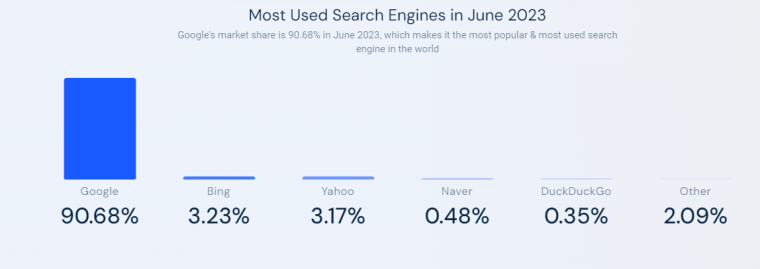On Monday, Microsoft’s CEO, Satya Nadella, spoke in court during U.S. Justice Department’s antitrust lawsuit against Google related to its dominance in search and search advertising.
Nadella mentioned that Microsoft tried to make Bing the main search engine on Apple smartphones, but Apple said no.
He also called out Google’s claim that it’s easy to change the default search engine on devices, calling it ‘bogus’.
Changing defaults today is easiest on Windows and toughest on mobile.
Backdrop Of The Legal Battle
In January 2020, the U.S. Justice Department filed a civil antitrust lawsuit against Google, charging Google with monopolizing search and search advertising. The Department claims that Google’s monopoly violates Sections 1 and 2 of the Sherman Act, which bans monopolistic business behaviors.
As of 2nd October 2023, Alphabet (Google) has a market cap of $1.666 trillion, making it the largest internet company by market cap.
Furthermore, as of June 2023, Google held 91% of the market share for search engines.
Government’s Legal Theory
The U.S. and state allies say Google unlawfully crushed competition by paying big money to phone makers, like Apple and Samsung, and web browsers, like Mozilla, which runs Firefox, to keep its search engine as the default choice. The Justice Department says that by securing this position, Google has been able to box out smaller rivals.
Google’s Defense
Google disagrees, saying these deals were just fair competition. It says these agreements didn’t block other search engines from the market or stop firms like Apple from promoting them. According to Google, users can easily switch if they want a different search engine.
Kent Walker, one of Google’s top lawyers and its president of global affairs, wrote:
People don’t use Google because they have to — they use it because they want to. It’s easy to switch your default search engine — we’re long past the era of dial-up internet and CD-ROMs.
What Does The Law Say?
Usually, a business can make exclusive deals without breaking any laws. They become a problem when a big company stops others from competing and can’t show how consumers benefit. In this case, the Justice Department needs to prove Google’s deals harmed competition, and then Google will argue its side, saying consumers actually benefit.
Who Is Leading The Trial?
Judge Amit Mehta, chosen by President Barack Obama in 2014, will be in charge of the trial. It’s a type of trial with no jury, so Judge Mehta will decide the outcome. The trial may last about three months.
What Are The Implications?
If Judge Mehta decides that the Justice Department is right, it’s not clear what will happen to Google. It could be anything from paying fines to changing the way the company works, which might change the way we use the internet.
Microsoft’s Struggles Highlight Google’s Search Supremacy
Prosecutors are using testimony from Nadella and some other big shots from Microsoft to make their point stronger, showing that even a monolith like Microsoft couldn’t shake Google’s top spot in search.
Last week, Microsoft’s business development executive, Jonathan Tinter, told the court that even though they offered Apple a better deal to use Bing, they couldn’t make a deal. They were even ready to lose a lot of money on this.
Tinter also said that to use the Android system on its Microsoft Duo phone, they had to use Google Search as the default, and couldn’t use Bing instead.
Bing only held 3% of the search engine market share as of June 2023.
Old Legal Battle Echoes in New Government Lawsuit Against Google
The last antitrust fight of this magnitude happened when the government sued Microsoft in 1998. The case said Microsoft was being unfair by tying its different products together, making it hard for other companies to compete and forcing people to use its products.
The judge sided with the government, saying Microsoft was indeed breaking competition laws and making it tough for others in the market. However, Microsoft had to back down on some of its most monopolistic policies to win the case.
Now, it feels like déjà vu with the government suing Google on similar grounds.

